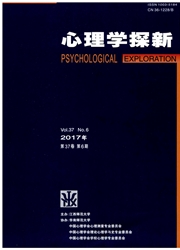

 中文摘要:
中文摘要:
采用大五人格简式量表、亲子依恋和同伴依恋简表以及青少年孤独感量表调查458名高中生,探索“大五”人格、依恋和青少年孤独感的关系。结果表明:“大五”人格与青少年孤独感关系紧密,神经质与青少年孤独感呈显著正相关,其它人格维度与孤独感呈显著负相关,外向性、宜人性和神经质是孤独感的有力预测变量;“大五”人格也是青少年依恋关系的重要影响因素,责任性、神经质和宜人性是亲子依恋的有力预测因素,而外向性、宜人性和神经质是同伴依恋的有力预测因素;亲子依恋和同伴依恋均显著负向预测青少年孤独感,且同伴依恋的预测效力更强;在不同人格维度与青少年孤独感之间,亲子依恋和同伴依恋的总体中介效应不同,而在同一人格维度与青少年孤独感之间,同伴依恋的中介效应显著高于亲子依恋的中介效应。
 英文摘要:
英文摘要:
In order to explore the relations among Big Five personality, parental attachment, peer attachment and adolescents' loneli- ness ,we conveniently chose 500 high school students from two public high schools in Henan province as our subjects. The subjects were investigated with such instruments as NEO Five - Factor Inventory ( NEO - FFI ), Interpersonal Competence Questionnaire ( ICQ ) and UCLA Loneliness Scale. The results indicated that, Big Five personality was related closely with adolescents' loneliness: neurotieism correlated significantly and positively with loneliness, the other four personality dimensions correlated significantly and negatively with loneliness ; extraversion, agreeableness and neurotieism were strong predictors of loneliness; Big Five personality were also important fac- tors which influence adolescents' parental attachment and peer attachment: conscientiousness, neuroticism and agreeableness were strong predictors of adolescents' parental attachment, while extraversion, agreeableness and neuroticism were strong predictors of peer attachment;parental attachment and peer attachment together produce different indirect effects between different "Big Five" personality dimensions and adolescents' loneliness,and peer attachment produce significantly higher indirect effects than parental attachment be- tween some "Big Five" personality dimension and adolescents' loneliness.
 同期刊论文项目
同期刊论文项目
 同项目期刊论文
同项目期刊论文
 期刊信息
期刊信息
